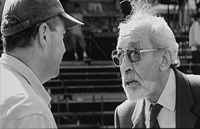
|
 |
Happy
Birthday, Mr. Mograbi
|
ISRAEL,
FRANCE / 1999 / Hebrew, Arabic, English / Color / 16mm /77min
Director, Script, Editing, Sound, Producer: Avi Mograbi
Photography: Eytan Harris, Ron Katzenelson, Itzik Portal, Yoav
Gurfinkel, Oded Kimhi, Yoav Dagan
Co-producer: Serge Lalou-Les Films D'Ici
Source: Avi Mograbi
World Sales: d.net.sales
Karwendelstr. 21, 12203 Berlin, GERMANY
Phone: 49-30-84306168/ Fax: 49-30-84306167
E-mail: majade@t-online.de

|
|
Avi Mograbi
Born in Israel in 1956. Between 1979 and 1982 he studied philosophy
at Tel Aviv University and art at the Ramat Hasharon Art School. Since
1982 he has been working as first assistant director in local and
foreign feature films and commercials. Directed his first film Deportation
in 1989. Filmography includes The Reconstruction (1994),
How I Learned to Overcome My Fear and Love Arik Sharon (1997),
and Relief (1999, video installation). As scriptwriter,
A Tale That Starts With a Snakes Funeral (1993). |
Israel is a place where government and society undergo sweeping change
as a result of actual government policy decisions. This can be seen
in the closely watched problems in Palestine. For reasons political
and religious, the national governance is determined by the opposing
labor and conservative parties as well as by religious parties, all
of which have great influence not only domestically but internationally.
What meaning do the past, present and future of Israel hold for those
born after the founding of the nation in 1948? Avi Mograbi, who both
made and appears in this picture, is a documentary filmmaker who was
42 years old at the time of the shoot. He was commissioned to produce
a film in commemoration of the 50th anniversary of the founding of
his country. He winds up being commissioned at the same time by a
Palestinian to make a documentary film from the perspective of his
people about what might be called the history of Israel from the reverse
side. Jew and Arab. His position is complicated. That's because, through
his shooting of the two pictures, he conversely faces an inconsistency:
what is he himself, the maker of these films? To an Israeli the creation
of art automatically carries political meaning. By producing a film
on the history of his country and of himself, newly-emerging aspects,
problems, and faults of Israel are brought into relief. It is a new
type of private documentary, innovative and powerful, and at the same
time it is a condensation of possibilities of the variously-evolving
Israeli film scene of today. [Watabe Minoru]
Director's
Statement
In 1997 my birthday fell two days before Israel's Independence Day
celebration (the Israeli Independence Day is marked according to the
Hebrew, lunar, calendar.) Since I had been in New York I celebrated
my own birthday two days late on Independence Day. This coincidence
provoked the thoughts that eventually became the nucleus of Happy
Birthday, Mr. Mograbi. In 1998 Israel celebrated its 50th anniversary
and I decided to celebrate my own anniversary on the same date even
though my actual birthday was ten days later.
The raw idea was to tell two parallel stories. The first about the
making of a documentary following the jubilee celebrations. The second
about the middle age crisis of the filmmaker making this documentary
- me - whose birthday coincides with that of the state.
For several months I wrestled with this idea but something was bothering
me. I realized there was no way to mark these two anniversaries without
marking a third - the Nakba - the 50th anniversary of the Palestinian
catastrophe.
Now, the third channel of the script began to take shape. In this
story line a Palestinian producer hires the same filmmaker to shoot
stuff for a film the Palestinians are making to mark the Nakba.
The material he shoots for the Palestinian project takes the form
of a kind of a disruption of the film (the "final" one,
the one you watch.) Shots of ruined Palestinian houses and ruins of
former Palestinian villages take over without warning.
I tried to make a film consisting of three different story lines that
run through one man's consciousness. Only the materials here have
greater freedom than usual. They run along the script notes for a
while and then take over the script and create their own order of
events. The filmmaker, poor guy, has to cope with the consequences
of the new conjunctures. |
  |
|
before  next next |
COPYRIGHT:Yamagata International Documentary Film Festival Organizing Committee |